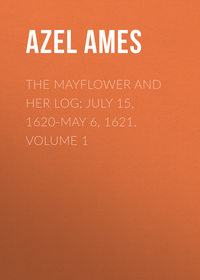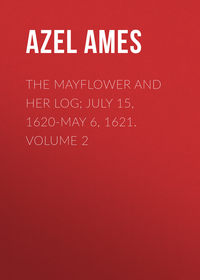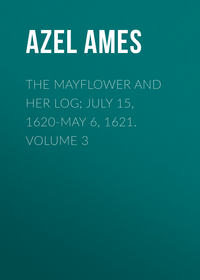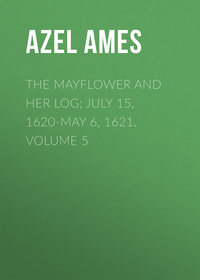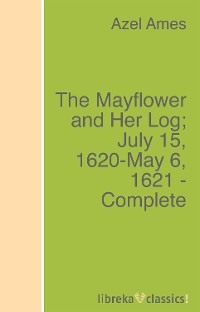 полная версия
полная версияThe Mayflower and Her Log; July 15, 1620-May 6, 1621. Volume 4
Thomas English (or Enlish), Bradford tells us ("Historie," Mass. ed. p. 533), "was hired to goe Master of a [the] shallop here." He, however, "died here before the ship returned." It is altogether probable that he was the savior of the colony on that stormy night when the shallop made Plymouth harbor the first time, and, narrowly escaping destruction, took shelter under Clarke's Island. The first three governors of the colony, its chief founders,—Carver, Bradford, and Winslow,—with Standish, Warren, Hopkins, Howland, Dotey, and others, were on board, and but for the heroism and prompt action of "the lusty sea man which steered," who was—beyond reasonable doubt—English, as Bradford's narrative ("Morton's Memorial") shows, the lives of the entire party must, apparently, have been lost. That English was, if on board—Bradford shows in the "Memorial" that he was—as Master of the shallop, properly her helmsman in so critical a time, goes without saying, especially as the "rudder was broken" and an oar substituted; that the ship's "mates," Clarke and Coppin, were not in charge (although on board) fully appears by Bradford's account; and as it must have taken all of the other (four) seamen on board to pull the shallop, bereft of her sail, in the heavy breakers into which she had been run by Coppin's blunder, there would be no seaman but English for the steering-oar, which was his by right. Had these leaders been lost at this critical time,—before a settlement had been made, —it is certain that the colony must have been abandoned, and the Pilgrim impress upon America must have been lost. English's name should, by virtue of his great service, be ever held in high honor by all of Pilgrim stock. His early death was a grave loss. Bradford spells the name once Enlish, but presumably by error. He signed the Compact as Thomas English.
William Trevore was, according to Bradford, one of "two seamen hired to stay a year in the countrie." He went back when his time expired, but later returned to New England. Cushman (Bradford, "Historie," p. 122) suggests that he was telling "sailors' yarns." He says: "For William Trevore hath lavishly told but what he knew or imagined of Capewock Martha's Vineyard, Monhiggon, and ye Narragansetts." In 1629 he was at Massachusetts Bay in command of the HANDMAID (Goodwin, p. 320), and in February, 1633 (Winthrop, vol. i. p. 100), he seems to have been in command of the ship WILLIAM at Plymouth, with passengers for Massachusetts Bay. Captain Standish testified in regard to Thompson's Island in Boston harbor, that about 1620 he "was on that Island with Trevore," and called it "Island Trevore." (Bradford, "Historie," Deane's ed. p. 209.) He did not sign the Compact, perhaps because of the limitations of his contract (one year).
–– Ely (not Ellis, as Arber miscalls him, "The Story of the Pilgrim Fathers," p. 377) was the other of the "two seamen hired to stay a year," etc. He also returned when his time expired. (Bradford, Hist. Mass. ed. p. 534.) He did not sign the Compact, probably for the reason operative in .Trevore's case. A digest of the foregoing data gives the following interesting, if incomplete, data (errors excepted):—
Adult males (hired seamen and servants of age included)… 44 Adult females (including Mrs. Carver's maid)………….. 19 Youths, male children, and male servants, minors………. 29 Maidens, female children……………………………. 10 – 102
Married males……………………………………… 26
Married females……………………………………. 18
Single (adult) males (and young men)…………………. 25
Single (adult) females (Mrs. Carver's maid)…………… 1
Vocations of adults so far as known (except wives, who are presumed housekeepers for their husbands):—
Carpenters………………………………………… 2
Cooper……………………………………………. 1
Fustian-worker and silk-dyer………………………… 1
Hatter……………………………………………. 1
Lay-reader………………………………………… 1
Lady's-maid……………………………………….. 1
Merchants…………………………………………. 3
Physician…………………………………………. 1
Printers and publishers…………………………….. 2
Seamen……………………………………………. 4
Servants (adult)…………………………………… 10
Smith…………………………………………….. 1
Soldier…………………………………………… 1
Tailor……………………………………………. 1
Tradesmen…………………………………………. 2
Wool-carders………………………………………. 2
Allowing for the addition of Wilder and the two sailors, Trevore and Ely, who did not sign it, the number of those who signed the Compact tallies exactly with the adult males. Besides these occupations, it is known that several of the individuals representing them were skilled in other callings, and were at some time teachers, accountants, linguists, writers, etc., while some had formerly practised certain handicrafts; Dr. Fuller, e.g. having formerly been a "silk-worker," Brad ford (on the authority of Belknap), a "silk-dyer," and others "fustian-workers." Hopkins had apparently sometime before dropped his character of "lay- reader," and was a pretty efficient man of affairs, but his vocation at the time of the exodus is not known.
The former occupations of fourteen of the adult colonists, Browne, Billington, Britteridge, Cooke, Chilton, Clarke, Crackstone, Goodman, Gardiner, Rogers, Rigdale, Turner, Warren, and Williams are not certainly known. There is evidence suggesting that Browne was a mechanic; Billington and Cooke had been trained to husbandry; that Chilton had been a small tradesman; that Edward Tilley had been, like his brother, a silk- worker; that Turner was a tradesman, and Warren a farmer; while it is certain that Cooke, Rogers, and Warren had been men of some means.
Of the above list of fourteen men whose last occupations before joining the colonists are unknown, only five, viz. Browne, Billington, Cooke, Gardiner, and Warren lived beyond the spring of 1621. Of these, Warren died early, Gardiner left the colony and "became a seaman;" the other three, Billington, Browne, and Cooke, became "planters." Thomas Morton, of "Merry Mount," in his "New Eng land's Canaan" (p. 217), gives Billington the sobriquet "Ould Woodman."
The early deaths of the others make their former handicrafts—except as so much data pertaining to the composi tion and history of the colony— matters of only ephemeral interest.


